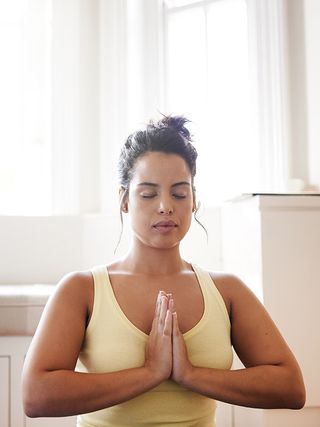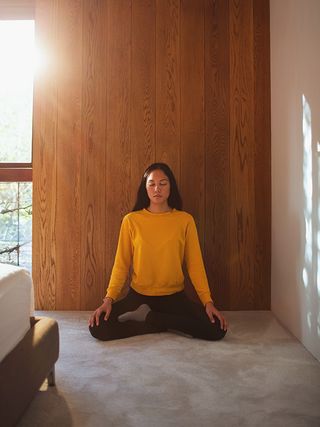Use This One Trick for Better Focus and Concentration

I don't know about you, but with my phone, computer, emails, social media, text messages, etc., I find myself having trouble focusing on one thing. I start doing one task but then get a notification on my phone and start thinking about something else entirely. This happens both at work and at home. I could be vacuuming, but then I remember I should really clean my bathroom, and then I'm trying to do two chores at once. It can feel like I have a million things going on at once, and it can be so damn frustrating.
However, I recently found out there's one trick I haven't tried yet to stay focused: meditation. The act of meditating has a lot of benefits: It can reduce stress and anxiety, help you take control of negative emotions or feelings, help you stay in the present, keep you calm, and improve your focus and concentration. While all of these benefits sound like wins in my book, the last one is especially appealing to me.
How Can Meditation Help With Focus and Concentration?

"Meditation is like a bicep curl for the brain—brain scans have proven that meditation helps increase focus and that it literally changes the structure of the brain," says Suze Yalof Schwartz, CEO and founder of Unplug Meditation. "We have between 50,000 to 80,000 thoughts per day, which is a lot of thoughts and distractions. Meditation allows us to move away from distractions by placing our awareness on the experience of breathing, which in turn helps increase focus."

Studies have shown that meditation actually increases the thickness of the gray matter of the prefrontal cortex, which helps increase focus, adds Megan Jones Bell, Psy.D., Headspace's chief science officer.
"By training your mind to be present and let go of distracting thoughts and emotions, you become better able to keep your mind on task even when the task might get boring," Bell says. "That's what we see through research on Headspace—that even when research subjects are completing repetitive tasks, they are better able to maintain focus after training with the app. Part of what is helping is that through meditation, you are more aware of your thoughts, so it's easier to tell when your mind has wandered."
Tips for Practicing Meditation

That all sounds great and life-changing and all, but to be honest with you, I always thought I'd never be the "meditation type." It's hard for me to relax anywhere. Even when I'm supposed to be doing something relaxing like getting a massage or lying on the beach, I'm still tense, and the thoughts are still free-flowing.
But I'm determined to try something new and see if I can train my brain, so I asked Bell and Schwartz for some meditation tips for first-timers (like myself). Read on for what they had to say below.
1. Try Different Types of Meditation

It's not one-size-fits-all, so if one method isn't working for you, try another one. "There is a common misperception that meditation can only be practiced in one particular way, such as sitting with your eyes closed with your legs crossed for hours at a time," Bell explains. "While this is one approach to meditating, you can always fit the practice into your lifestyle in whatever way it works for you, even if you can only spare three minutes at a time. Walking meditation can be a great way of practicing meditation for those who want a different way into this practice."
2. Start Slow

"We understand that everyone has busy lives, which is why we recommend starting slow with three- or five-minute meditations and building up to at least 10 minutes a day," Bell recommends. "Establishing a routine meditation practice with Headspace has been shown to have scientific benefits such as reducing stress in 10 days, but we also understand that it’s not realistic for each and every person to establish a daily habit. If you feel that daily meditation isn't for you, you can also integrate mindfulness into other parts of your day, like a walk or the practice of eating or during your commute."
3. Focus on Your Breath

Schwartz says breathing techniques are a good place to start when you want to improve your focus. "I believe the 16-second technique, also known as box breathing and used by the military, police officers, and high school students for testing, is one of the most effective ways to focus on demand," she explains. "Just breathe in through the nose for four seconds, hold the breath for four seconds, exhale for four seconds, and hold the breath out for four seconds."
4. Add It to Your Morning Routine

Meditating first thing in the morning can put you in a better mindset for the rest of the day. "My best tip for meditating every day is to RCM: rise, click (the app), meditate," Schwartz says. "Do not take a vote if you should or shouldn't—you may talk yourself out of it. The best way to create a consistent practice is to do it before you get out of bed, before you do anything, and watch your day unfold with passion, purpose, and presence."
5. Use an App

You certainly don't need an app to meditate, but if you're completely new to the practice, it might help to have some guidance. I've tried and enjoyed both Unplug and Headspace, but there are so many other ones out there, so choose one that works best for you. I find it's all based on personal preference, so you might have to give a few a try before you find one you really love.
The great thing about these apps is that a lot of them have meditations for very specific needs, so you can really personalize your experience. For example, Bell says Headspace has an entire course dedicated to finding focus by employing meditation techniques. And on Unplug, there's a Sixty Second Superpower Focus that can help you concentrate on one singular thing.
Next up: Mindfulness: What It Really Means and How to Practice It
This article was originally published at an earlier date and has since been updated.
Disclaimer
This article is provided for informational purposes only and is not intended to be used in the place of advice of your physician or other medical professionals. You should always consult with your doctor or healthcare provider first with any health-related questions.
Sarah is lifestyle writer and editor with over 10 years of experience covering health and wellness, interior design, food, beauty, and tech. Born and raised in Los Angeles, she attended New York University and lived in New York for 12 years before returning to L.A. in 2019. In addition to her work on THE/THIRTY and Who What Wear, she held editor roles at Apartment Therapy, Real Simple, House Beautiful, Elle Decor, and The Bump (sister site of The Knot). She has a passion for health and wellness, but she especially loves writing about mental health. Her self-care routine consists of five things: a good workout, “me” time on the regular, an intriguing book/podcast/playlist to unwind after a long day, naps, and decorating her home.
-
 I Live for Yoga and Pilates—These Are the Pieces That Help My Flow
I Live for Yoga and Pilates—These Are the Pieces That Help My FlowTake notes.
By Humaa Hussain
-
 It's Time to Get Our Nutrition in Check for Summer—This App Is Making It Easy
It's Time to Get Our Nutrition in Check for Summer—This App Is Making It EasyThe recipe ideas are endless.
By Who What Wear
-
 This Founder Shares Why We Should Start Celebrating Rest
This Founder Shares Why We Should Start Celebrating RestBurnout is nothing to be proud of.
By Kia Topps
-
 If You're Battling With Digestive Issues, This Could Be Why
If You're Battling With Digestive Issues, This Could Be WhyTurns out, you may not have IBS after all.
By Kia Topps
-
 Our Editors Own a Lot of Sneakers, But This Pair Comes in First Place Every Time
Our Editors Own a Lot of Sneakers, But This Pair Comes in First Place Every TimeA major win.
By Aniyah Morinia
-
 Why Dr. Deepika Chopra Believes that Optimism is Resiliency
Why Dr. Deepika Chopra Believes that Optimism is ResiliencyWhy you should start embracing every feeling.
By Kia Topps
-
 How TikTok's Favorite Photographer Helped Me Find My Confidence
How TikTok's Favorite Photographer Helped Me Find My ConfidenceI renewed my relationship with myself.
By MacKenzie Green
-
 I Changed My Mind About Strength Training When I Tried This Workout
I Changed My Mind About Strength Training When I Tried This WorkoutMy confidence is officially on 10.
By Kia Topps


